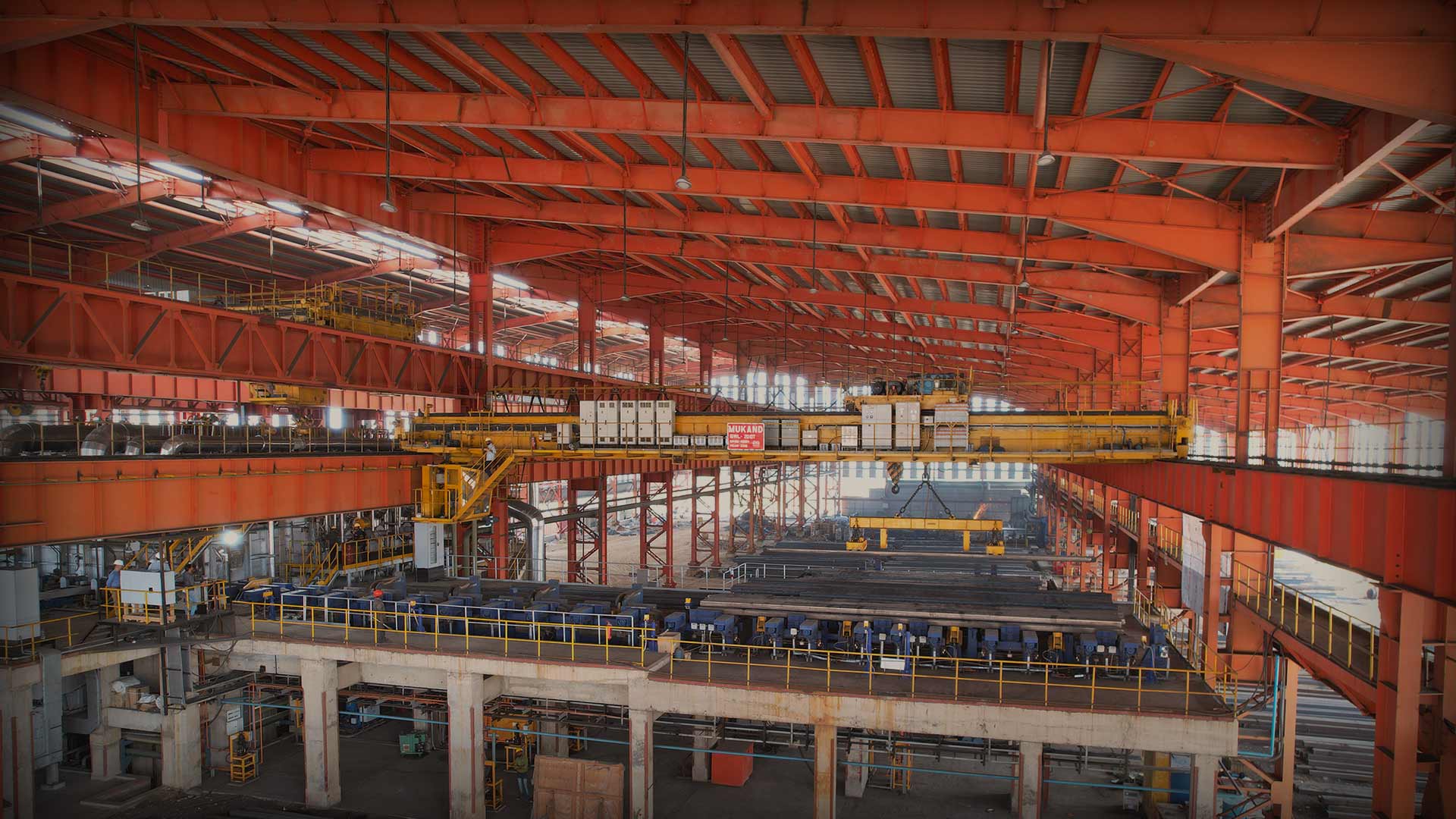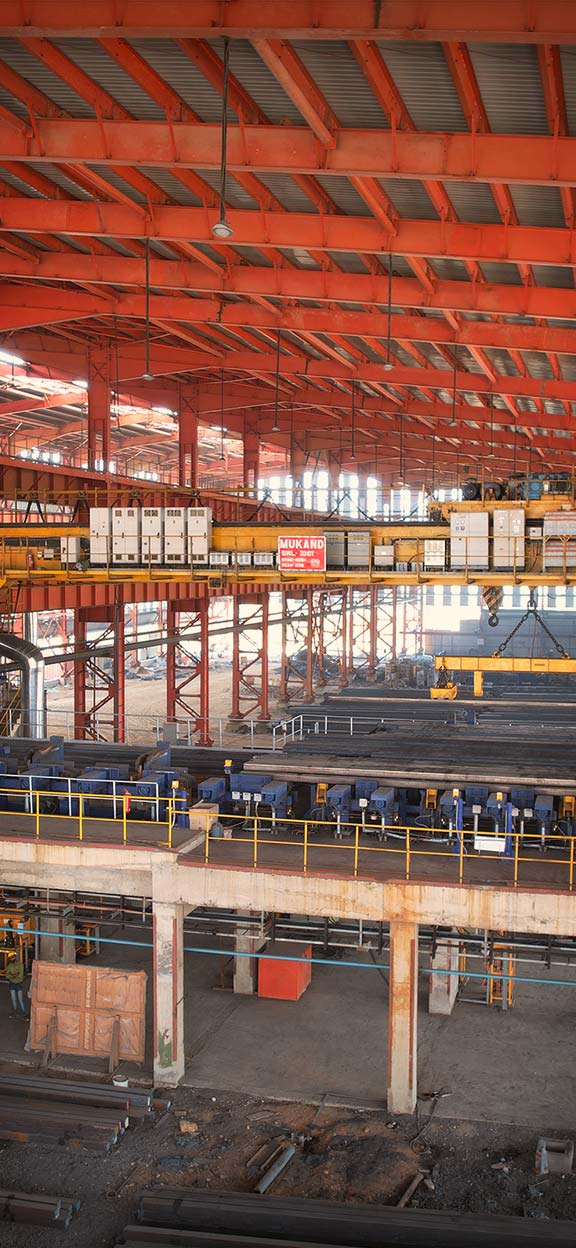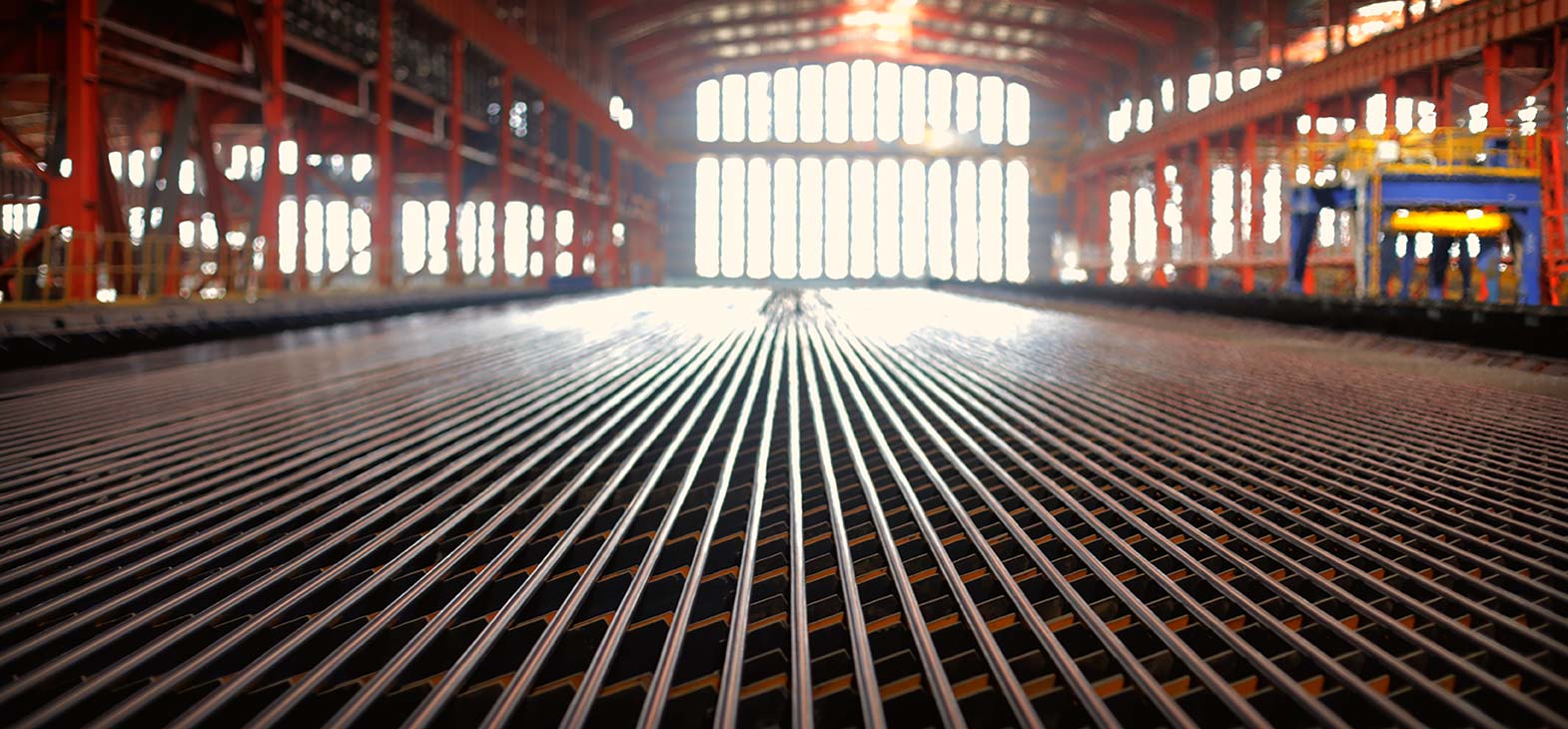



An insight into the inner workings and history of the organisation that has redefined the steel manufacturing industry in India and is respected globally for cutting-edge products that meet the highest quality standards across sectors that demand nothing short of the best.
The world we occupy is changing. Driven by an insatiable appetite for high-quality steel, innovation-led growth, change, and challenges have become our way of doing business. With the traditional boundaries of what is possible forced aside by the exacting demands of the future, our role as one of the top steelmakers in the country is now more critical than ever, and we are aggressively expanding to fortify that position and rise to the occasion.
Each day, the products we create for customers all over the globe touch the lives of ordinary people from every walk of life. Whether it’s an integral component of a car’s transmission to a vital cog in a nuclear reactor that supplies power to millions of people, our products enable life, commerce, and industry.
The gravity of what we do isn’t lost on any of our employees, people who live, and breathe Mukand. From the management team to the technicians at the production facilities and the scientists tirelessly working on our next big idea, a culture of continuous improvement and an entrepreneurial spirit drives us to push forward, never resting on our laurels, or our 80-year heritage.
Today, Mukand is a far cry from the Company that started operations as a ‘Re-Rolling Mill’ and a Foundry. With a firm presence across two key sectors, Speciality Steelmaking, focusing on long products and Heavy Machinery, we are a multi-division, multi-product conglomerate, and a vital division of the Bajaj Group of Companies. Through our association with one of the most trusted business houses in India and abroad, we embody the values synonymous with all Bajaj Group Companies; customer centricity, trust, and unassailable integrity.
Journey with us to revisit the history of Mukand, highlighting our highs and milestones, from a fledgling steel producer to an industry bellwether.
Mukand Iron & Steel Works Limited is registered on November 29, 1937, with an issued capital of INR 1.37 million. The company operates its re-rolling mills and foundry in Lahore and at Reay Road, Bombay.
Two new rolling mills and an electric arc furnace are commissioned at the factory in Lahore. Lala Mukand Lal, who at the time had a controlling interest in the company, expresses his desire to leave to Mahatma Gandhi, his mentor, who in turn asks Jamnalal Bajaj & Jeewanlal Motichand to take over the company, which is under a severe financial strain, and steer it into the future. They do so after some persuasion!
An 'Electric Arc Furnace' is built and commissioned at the Bombay factory. A large 'Rolling Mill' is also installed.
The factory in Lahore remains closed for several months during the partition. While the employees saved the factory itself from looting & wanton destruction by rioters, it was requisitioned by the West Punjab Government (Pakistan) under the West Punjab Economic Rehabilitation Ordinance, 1947. Back in India, financial turbulence at the time slowed progress on the development of the new steel foundry at Kurla, Bombay. The Directors' report to the shareholders for the year ended March 31, 1947, states: "During the days immediately preceding and following the partition of the country, a large number of the Lahore Factory Staff continued to remain there and were thus able to save the factory from damage to property and stock from the hands of the rioters at Lahore. In doing so, they displayed courage and devotion to duty for which we extend our warm appreciation and sincere thanks to them."
Work on a new 'Electric Arc Furnace' for making steel casting and special steels, including alloy steels, commences at Kurla, Bombay. Shifting of the factory at Reay Road to Kurla also begins. The company transfers ownership of its Lahore factory to The Batala Engineering Co. (Pakistan) Ltd., Lahore, by a 'Deed of Conveyance' in exchange for shares of paid-up value of INR 0.97 million of the Batala Engineering Co. Ltd., Batala, in the State of Punjab in India. Its factory at the time consisted mainly of a Machine Shop, 'Cast Iron Foundry', and a steel 'Re-Rolling Mill'.
Transfer of shares of paid-up value of INR 0.89 million out of the shares of The Batala Engineering Co. Ltd. received by the company in exchange for its property in Pakistan is put into effect. The Batala Engineering Co. Ltd. becomes a Mukand Iron & Steel Works Ltd subsidiary. The subsidiary company is later rechristened 'Beco Engineering Company Limited'.
Shifting of the factory from Reay Road to Kurla is completed. The new 'Rolling Mills' commence operations at Kurla, in addition to the 'Steel Foundry' already in operation.
Expansion of the 'Steel Foundry' at Kurla commences and is completed in about a year.
The Machine Building and structural programmes at Kurla commence with the fabrication of mechanical and structural parts of furnaces. Preliminary work for the steel plant at Kalwe commences with a momentous decision taken by the company directors to forge ahead with the installation of a 'Continuous Casting' machine for making billets, a technology that was still in its infancy even in the West. Mukand would be the first steel producer in the country to adopt this technology and make it a success.
The steel plant at Kalwe commences operations with the commissioning of the 'Electric Arc Furnace' and 'Continuous Casting Machine' in 1965, followed by a Swedish 'Wire Rod Mill in 1966. These two events heralded the first time in the country that high carbon steel wire rods were indigenously produced and were a significant boost to the goal of import substitution. The capacity of the structural shop, by now shifted to Kalwe, was rechristened as the 'Machine Building Division'.
A changing of the guard. The company management transitions from Jeewan Limited to a Board of Directors with Kamalnayan Bajaj as Chairman and Viren J. Shah as Vice-Chairman & Managing Director.
On the untimely demise of Kamalnayan Bajaj, Viren J. Shah becomes the Chairman and continues as Managing Director of the Company. Ramkrishna J. Bajaj becomes Vice-Chairman of the Board.
The Contracts & Engineering Services Division is rechristened as the 'Engineering Construction Division'. It offers services in feasibility surveys, project engineering, planning, construction, coordination, commissioning of equipment, etc.
Mukand Holdings Limited is registered under The Companies Act, 1956.
The modernisation push of the Wire Rod Mill at Kalwe is completed with the installation and commissioning of an 'Eight-Stand, High-Speed Finishing Block' and an 'Easy-Draw Continuous Cooling System'. Mukand was only the fourth plant in the world at the time to adopt this technology for wire rods.
A 'Ladle Refining Furnace', 'Vacuum Degassing Station', and a 10.5-metre radius 'Bloom Caster' are commissioned in October as part of a modernisation-cum-expansion programme of the steel making facilities at Kalwe.
The first phase of the modernisation-cum-expansion program of the steel making facilities at Kalwe is completed with the commissioning of an ultra-high-power furnace. With this phase completed, the second phase is taken up, and the modernisation program continues as an ongoing process in all areas of the company's operations. Mukand Engineers Limited is registered under The Companies Act, 1956.
Mukand Iron & Steel Works Limited is rechristened as 'Mukand Limited' on and from March 23 and adopts a new logo. Mukand Dravo Wellman Limited is registered under The Companies Act, 1956.
An 'Oxygen Top & Bottom Blown Converter' (OTBC), a 'Blooming Mill with a Walking Beam Furnace', 'Automatic Screw Down System with Computerised Process Control', and a 'Bright Bar Unit with Modern Heat Treatment Facilities' are installed in the steel plant at Kalwe. Mukand was the first in the country to establish an OTBC to manufacture stainless steel. There were only three other plants in the world that used this technology, at the time. Facilities for 'Stainless Steel Coil Finishing' are installed at Kurla, and the modernisation of the 'Wire Rod Mill' at Kalwe is taken up. The Batala Facility of Beco Engineering Co. Ltd. is closed, following which it is merged with Mukand and becomes Beco Engineering, a division of Mukand Limited. Mukand International Limited becomes a company incorporated under the Companies Act, 1985 of the United Kingdom, with a registered office in London.
A new 'Wire Rod Mill' at Kalwe is installed and commissioned. Ramkrishna Bajaj, the Vice-Chairman, passes away on September 21, 1994, after a prolonged illness. Rahul Bajaj is appointed Vice-Chairman on November 25, 1994. The company starts producing valve castings, corner castings, manganese steel crossings, cement mill items, and door frames for freight cars in the steel foundry. Mukand Engineers Limited is formed. The 'Steel Foundry', 'Bright Bars', and 'Blooming Mill' divisions receive 'Certification of Approval' under ISO 9002 from Bureau Veritas Quality International (BVQI).
The 'Steel Plant' and 'Heavy Castings' divisions receive 'Certificates of Approval' under ISO 9002:1994, while the 'Machine Building Division' receives a certificate under ISO 9001:1994 from BVQI. The company enters into a strategic alliance with Kalyani Ferro Industries Limited to set up 'Mini Blast Furnaces' at Hospet, Karnataka.
Two 'Short-Term Cycle Furnaces' are imported from the USA and installed for heat treatment of wire rods. The manufacture of a 'Converter and Anode Furnace' for copper smelting is completed to the exacting design & standards of Kumera Corporation of Finacle. A prestigious INR 5,440 million project, awarded to the company at Rourkela, is completed. The company enters a strategic alliance with Kalyani Ferrous Industries Limited & Kalyani Steels Limited to set up an Iron & Steel making facility at Hospet, Karnataka. The quality systems of all manufacturing divisions of the company are covered by 'Certificates of Approval' under the ISO 9000 family of standards.
The Rourkela plant is handed over to project authorities of Rourkela Steel after completion of the project.
Production of blooms at Hospet commences in August 1998. An 'Energy Optimising Furnace' is installed with technical know-how from KORF Technologies, Brazil, through TATA Korf Engineering Services. A 'Continuous Caster' is imported from Technit, Italy, and installed. The Japanese Institute of Plant Maintenance is engaged to train the company's personnel for TPM.
Viren J. Shah steps down as Chairman on December 1, 1999, and Rahul Bajaj takes over. A 22MW power plant is installed and commissioned in March 2000. The company disposes of its stake in International Aluminium Products Limited and Mukand Mc. Nally Wellman Limited. The company's equity shares become eligible for dematerialisation in 1999.
The Road Construction Division (RCD) is established.
The Hospet plant commences commercial production. RCD gets the contract from JSC Centrodorstroy. The Steel Plant in Hospet is certified 9002-1994 by BVQI.
With more than 50% of the company's net worth eroded, it is identified as a 'Potentially Sick Industrial Company' under the Sick Industrial Companies (Special Provision) Act, 1985. Corporate Debt Restructuring gets approved.
Rights Issue to the company's equity shareholders on January 9, 2004, is approved. It opens on January 27, 2004, and closes on February 26, 2004. Permission is received from the Commissioner of Labour to close the Kurla Foundry in 2003. The company's shares are delisted from Delhi and Ahmedabad Stock Exchanges and are listed on BSE & NSE instead. The 'Machine Building Division' gets the TPM Award from the 'Japan Institute of Plant Maintenance (JIPM).
The company ceases to be a "Potentially Sick Industrial Company". The Hospet plant obtained TS 16949:2002 and ISO 14001, specifically meant for the automotive industry.
The company's stainless steel is approved for use in the manufacture of nuclear reactor equipment. At the time, Mukand is the first steelmaker in India with products approved for use in such critical applications. A new Logo for the company is adopted. The steel plant receives TPM in Dec 2005. The sale of the Kurla land is completed. The company's bearing steel gets a seal of approval from the world's largest steel bearings manufacturer. A 400 MT capacity EOT crane is manufactured for the first time by Mukand. A third 'Mini Blast Furnace' (MBF) is installed at the Hospet plant.
The company adopts a Code of Conduct on affirmative action. Additional investments in the Steel Division are undertaken.
The third MBF is commissioned and commences commercial operations in May 2008. The company exports cranes to Indonesia and Dubai, and the Copper Plant equipment to Zambia. A joint venture with NV Bekaert SA of Belgium is established. Rahul Bajaj steps down as Chairman, and Niraj Bajaj becomes Chairman & Managing Director. 'Bell Furnaces' commence commercial production. The company's Heavy Machinery Division produces a 500-ton EOT crane and a 30-ton Electric Level Luffing (ELL) crane - its highest capacity so far. A 100-ton Hammerhead Crane is produced for the first time.
The modernisation program of the 'Wire Rod Mill' is completed. The Land in Lonand for the joint venture with Bekaert is acquired.
The 'Enhanced Specialty Steel Making', 'Rolling, Heat Treatment', 'Pickling', 'Bright Drawing', 'Peeling', and 'Wire Drawing Facilities' are commissioned and capacity achieved. A 'Level Luffing Travelling Tower Crane' with 60 MT carrying capacity and a 5.5-metre radius is manufactured with technical inputs from OBE of Japan.
The Joint Venture with Bekaert is terminated on March 29 2011, but the company continues to supply stainless steel wire rods to the venture. A 15MW captive power plant based on flue gases is commissioned in May 2011. The company continues its commitment to Quality and Safety with the recertification of all existing ISO certifications.
The company faces a raw material setback as the Supreme Court of India suspends mining operations, transportation, and the sale of Iron Ore in Bellary district in July 2011 and subsequently in Tumkur and Chitradurga. In total, 166 mines in 3 districts are banned. In a study conducted by the Bureau of Energy Efficiency (BEE) on energy consumption per ton of steel produced, Mukand's energy consumption level was the 4th lowest amongst 67 steel companies in India. Mukand introduces a mentoring programme for new joinees, and builds a gymnasium.
Viren Shah expires in March 2013. An MOU is signed with Sumitomo Corporation for MSMPL. A Sinter plant at Hospet is commissioned in Dec 2012. The steel slant in Kalwe adopts the 'Duplex Process' for making stainless steel.
MSMPL commences operations. A Rights issue is offered. The company exits from CDR after fully paying dues on maturity.
A 250 MT 'Single Failure Proof Crane' for ISRO is commissioned. A 100 MT capacity Trolley Crane, the largest capacity for such a crane at the time, is built. The company adopts a new accounting system - Ind AS. MASPL is formed. Sumitomo acquires 49% equity in MASPL in May 2018. The new company is called MSSSL.
A landmark in sustainability as 45% of the company's energy needs are met from wind and flue gases from the blast furnace. Mukand exceeds the target energy levels set by BEE, thus earning energy credits. The company and the country enter a nationwide lockdown to support the fight against COVID-19. Production is affected due to Oxygen being diverted for life-saving medical use. The company disposes of its 51% stake in MSSSL to Jamnalal Sons Private Limited. 54.34 acres of unutilised leasehold land in Kalwe is transferred.
Demerger of Alloy Steel Business from MSMPL into MSSSL
Collaborates with MGL to supply Piped Natural Gas (PNG) to its Thane Plant. Signs PDA for 43.75 MW AC Group Captive Solar Plant
Participates in Wire and Tube Exhibition, Dusseldorf Inaugurates its state-of-the-art 16 TPH boiler at Thane plant
If you answered yes, please take a few minutes to Apply for a Career at Mukand, don't forget to
tell us why you believe you are a good fit for our organisation.

Have a unique requirement? Get in touch with us. We have a steely resolve to help you find the product that best fits your needs, even if that means custom building you one that does.

